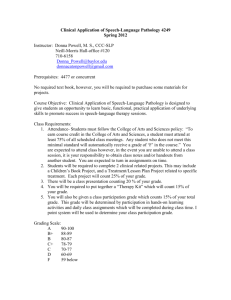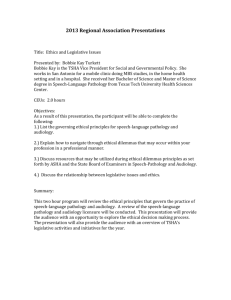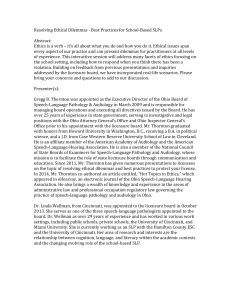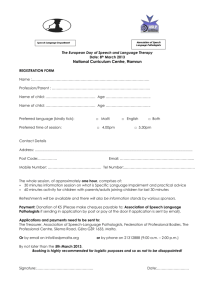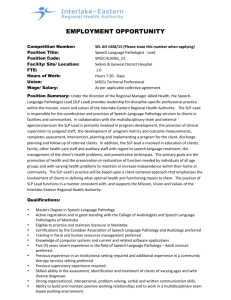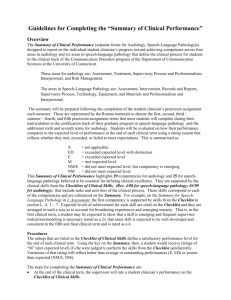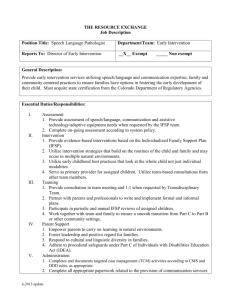Prop_Rules_2014 - Texas Department of State Health Services
advertisement
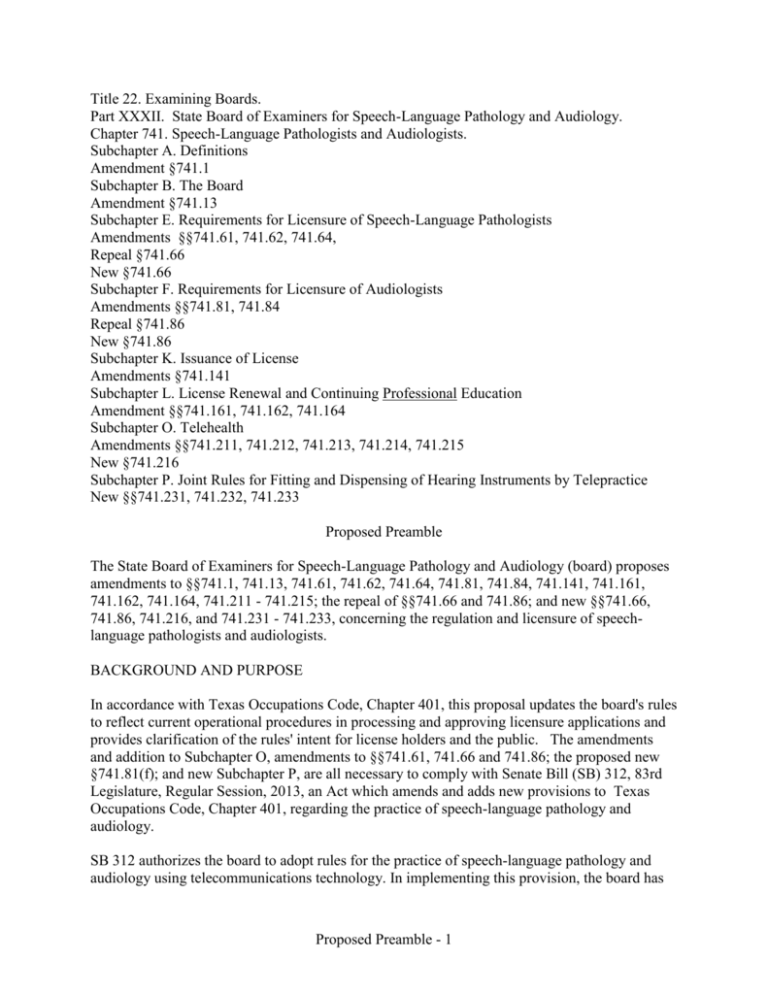
Title 22. Examining Boards. Part XXXII. State Board of Examiners for Speech-Language Pathology and Audiology. Chapter 741. Speech-Language Pathologists and Audiologists. Subchapter A. Definitions Amendment §741.1 Subchapter B. The Board Amendment §741.13 Subchapter E. Requirements for Licensure of Speech-Language Pathologists Amendments §§741.61, 741.62, 741.64, Repeal §741.66 New §741.66 Subchapter F. Requirements for Licensure of Audiologists Amendments §§741.81, 741.84 Repeal §741.86 New §741.86 Subchapter K. Issuance of License Amendments §741.141 Subchapter L. License Renewal and Continuing Professional Education Amendment §§741.161, 741.162, 741.164 Subchapter O. Telehealth Amendments §§741.211, 741.212, 741.213, 741.214, 741.215 New §741.216 Subchapter P. Joint Rules for Fitting and Dispensing of Hearing Instruments by Telepractice New §§741.231, 741.232, 741.233 Proposed Preamble The State Board of Examiners for Speech-Language Pathology and Audiology (board) proposes amendments to §§741.1, 741.13, 741.61, 741.62, 741.64, 741.81, 741.84, 741.141, 741.161, 741.162, 741.164, 741.211 - 741.215; the repeal of §§741.66 and 741.86; and new §§741.66, 741.86, 741.216, and 741.231 - 741.233, concerning the regulation and licensure of speechlanguage pathologists and audiologists. BACKGROUND AND PURPOSE In accordance with Texas Occupations Code, Chapter 401, this proposal updates the board's rules to reflect current operational procedures in processing and approving licensure applications and provides clarification of the rules' intent for license holders and the public. The amendments and addition to Subchapter O, amendments to §§741.61, 741.66 and 741.86; the proposed new §741.81(f); and new Subchapter P, are all necessary to comply with Senate Bill (SB) 312, 83rd Legislature, Regular Session, 2013, an Act which amends and adds new provisions to Texas Occupations Code, Chapter 401, regarding the practice of speech-language pathology and audiology. SB 312 authorizes the board to adopt rules for the practice of speech-language pathology and audiology using telecommunications technology. In implementing this provision, the board has Proposed Preamble - 1 modified existing Subchapter O so that the definitions in §741.211 apply to both audiologists and speech-language pathologists; §§741.212 through 741.215 apply only to speech-language pathologists; and §741.216 sets forth the requirements applicable only to audiologists engaging in telepractice. Subchapter P reflects the implementation of another provision in SB 312, one which requires the board and the State Committee of Examiners in the Fitting and Dispensing of Hearing Instruments (committee) to adopt joint rules to provide for the fitting and dispensing of hearing instruments by telepractice. Another section of SB 312, together with SB 162 (83rd Legislature, Regular Session, 2013), sets forth the terms under which the board is required to issue, as soon as practicable, a full professional license to a qualified military spouse,§§741.66 and 741.86. Finally, SB 312 also removes a six-hour course requirement for licensure ,§741.61, and provides for the renewal of certain lapsed audiology licenses issued between September 1, 2007 and 2011, to audiologists holding master’s degrees, §741.81(f). The proposed rule changes to the following sections of Chapter 741 clarify, correct, or update various rules to improve understanding and better reflect the licensing processes and procedures currently in place: §§741.1, 741.13, 741.62, 741.64, 741.84, 741.141, 741.161, 741.162, and 741.164. SECTION-BY-SECTION SUMMARY The amendments to §741.1 are proposed to clarify certain existing definitions and to define new terms used in new rule sections. The amendment to §741.13 is proposed to delete obsolete language. The amendment to §741.61 is proposed to identify the specific time frame for applications to which one of the educational requirements for licensure applies. The amendment to §741.62 is proposed to correct a grammatical error. The amendments to §741.64 are proposed to correct an exception to a paragraph and clarifies the requirements for signatures that are needed on formal documentation relating to the reimbursement of services rendered. The amendment proposed to §741.81 is to add a new subsection (f), to comply with SB 312, to set forth the conditions under which a lapsed license of an audiologist who was licensed between September 1, 2007 and September 1, 2011, may renew his or her audiology license, including the requirement that an application for such renewal must be filed before September 1, 2014. The amendment to §741.84 is proposed to correct a grammatical error. The amendments to §741.141 are proposed to clarify the types and expiration periods of licenses issued by the board. Proposed Preamble - 2 The amendments to §741.161 are proposed to clarify how renewal documentation can be submitted to the board. The amendments to §741.162 are proposed to clarify the areas in which continuing education credits may be earned; the number of continuing education hours that can be used for university and/or college course work; that continuing education hours can rollover to the next consecutive renewal period; that the board will accept continuing education registries as proof of completion of continuing education credits; and deletes obsolete language regarding American Medical Association Category I continuing education events. The amendments to §741.164 are proposed to correct grammatical errors. The amendments to §741.211 are proposed to add new terms and to clarify existing definitions relating to telehealth. The amendment to §741.212 revises the title of the rule and is proposed to clarify the service delivery models that speech-language pathologists may use to perform speech-language pathology services by telehealth. The amendments to §741.213 are proposed to provide that this particular telehealth rule applies only to speech-language pathologists and to clarify the requirements of the rule. The amendment to §741.214 is proposed to provide that this particular telehealth rule applies only to speech-language pathologists and to clarify the limitations on the use of telecommunications technology by speech-language pathologists. The amendment to §741.215 is proposed to provide that this particular telehealth rule applies only to speech-language pathologists. New §741.216 creates a new rule applicable to audiologists which sets forth all of the requirements for providing audiology services by telepractice. New §741.231, the first rule in new Subchapter P, sets forth the purpose of the joint rule between the board and the State Committee of Examiners in the Fitting and Dispensing of Hearing Instruments (committee) regarding fitting and dispensing hearing instruments by telepractice. New §741.232 defines the terms applicable to the rules in the new Subchapter P. New §741.233 sets forth the requirements for providing telehealth services for the fitting and dispensing of hearing instruments. The repeal and new revisions to §741.66 are proposed to comply with SB 312, 83rd Legislature, Regular Session, 2013, regarding licensing as speech-language pathologists of military service members, military veterans, and military spouses. Proposed Preamble - 3 The repeal and new revisions to §741.86 are proposed to comply with SB312, 83rd Legislature, Regular Session, 2013, regarding licensing as audiologists of military service members, military veterans, and military spouses. FISCAL NOTE Stewart Myrick, Interim Executive Director, has determined that for each year of the first five years the sections are in effect, there will be no fiscal implications to state or local governments as a result of enforcing or administering the sections as proposed. SMALL AND MICRO-BUSINESS ECONOMIC STATEMENT AND REGULATORY FLEXIBILITY ANALYSIS. Mr. Myrick has also determined that there will be no adverse economic impact to small businesses or micro-businesses required to comply with the sections as proposed. This was determined by interpretation of the rules that small businesses and micro-businesses will not be required to alter their business practices in order to comply with the sections. Therefore, an economic impact statement and regulatory flexibility analysis for small businesses and microbusinesses is not required. ECONOMIC COSTS TO PERSONS AND IMPACT ON LOCAL EMPLOYMENT There are no anticipated economic costs to persons who are required to comply with the sections as proposed. The amendments do no impose additional fees. There is no anticipated impact on local employment. PUBLIC BENEFIT Mr. Myrick has also determined that for each year of the first five years the sections are in effect, the public benefit anticipated as a result of enforcing or administering the sections will be to ensure the effective regulation of speech-language pathologists and audiologists in Texas, which will protect and promote public health, safety, and welfare. REGULATORY ANALYSIS The board has determined that this proposal is not a "major environmental rule" as defined by Government Code, §2001.0225. "Major environmental rule" is defined to mean a rule the specific intent of which is to protect the environment or reduce risk to human health from environmental exposure and that may adversely affect, in a material way, the economy, a sector of the economy, productivity, competition, jobs, the environment or the public health and safety of a state or a sector of the state. This proposal is not specifically intended to protect the environment or reduce risks to human health from environmental exposure. TAKINGS IMPACT ASSESSMENT Proposed Preamble - 4 The board has determined that the proposed rules do not restrict or limit an owner's right to his or her property that would otherwise exist in the absence of government action and, therefore, do not constitute a taking under Government Code, §2007.043. PUBLIC COMMENT Comments on the proposal may be submitted to Stewart Myrick, Interim Executive Director, State Board of Examiners for Speech-Language Pathology and Audiology, Mail Code 1982, P.O. Box 149347, Austin, Texas 78714-9347. Comments may also be sent through email to speech@dshs.state.tx.us. Please write “Comments on Proposed Rules” in the subject line. Comments will be accepted for 30 days following publication of the proposal in the Texas Register. STATUTORY AUTHORITY The amendments, repeals and new rules are authorized under Texas Occupations Code, §401.202, which provides the State Board of Examiners for Speech-Language Pathology and Audiology with the authority to adopt rules necessary to administer and enforce Texas Occupations Code, Chapter 401; as well as Texas Occupations Code, §§401.2022 and 401.405, which specifically authorize the board to adopt telepractice rules for audiologists and speechlanguage pathologists. The amendments, repeals and new rules affect Texas Occupations Code, Chapter 401. Sections for Repeal. §741.66. Speech-Language Pathology Licensing of Spouses of Members of the Military. §741.86. Audiology Licensing of Spouses of Members of the Military. Proposed Preamble - 5 Legend: Single Underline = Proposed new language [Bold print and brackets] = Current language proposed for deletion Regular Print = Current language (No change.) = No changes are being considered for the designated subdivision §741.1. Definitions. Unless the context clearly indicates otherwise, the following words and terms shall have the following meanings. [Refer to Texas Occupations Code, §401.01, for definitions of additional words and terms.] (1) ABA--The American Board of Audiology. (2) Act--Texas Occupations Code, Chapter 401, relating to Speech-Language Pathologists and Audiologists. (3) Acts--Texas Occupations Code, Chapter 401, relating to Speech-Language Pathologists and Audiologists; and Texas Occupations Code, Chapter 402, relating to Hearing Instrument Fitters and Dispensers. (4) [(3)] ASHA--The American Speech-Language-Hearing Association. (5) Assistant in audiology--An individual required to be licensed under Texas Occupations Code, §401.312, to provide audiological support services as described under §741.84 of this title (relating to Requirements for an Assistant in Audiology License). (6) Assistant in speech-language pathology--An individual required to be licensed under Texas Occupations Code, §401.312, to provide speech-language pathology support services as described under §741.64 of this title (relating to Requirements for an Assistant Speech-Language Pathology License). (7) Audiologist--An individual who holds a current, renewable, unrestricted license under Texas Occupations Code, §401.302 and §401.304, to practice audiology. (8) Audiology--The application of nonmedical principles, methods, and procedures for measurement, testing, appraisal, prediction, consultation, counseling, habilitation, rehabilitation, or instruction related to disorders of the auditory or vestibular systems for the purpose of providing or offering to provide services modifying communicative disorders involving speech, language, or auditory or vestibular function or other aberrant behavior related to hearing loss. (9) Board--The State Board of Examiners for Speech-Language Pathology and Audiology. (10) Client--A consumer or proposed consumer of audiology or speech-language pathology services. Proposed - 1 [(4) Ear specialist – A licensed physician who specializes in diseases of the ear and is medically trained to identify the symptoms of deafness in the context of the total health of the client, and is qualified by special training to diagnose and treat hearing loss. Such physicians are also known as otolaryngologists, otologists, neurotologists, otorhinolaryngologists, and ear, nose, and throat specialists.] [(5) Department--Department of State Health Services.] (11) Department--Department of State Health Services. (12) Ear specialist – A licensed physician who specializes in diseases of the ear and is medically trained to identify the symptoms of deafness in the context of the total health of the client, and is qualified by special training to diagnose and treat hearing loss. Such physicians are also known as otolaryngologists, otologists, neurotologists, otorhinolaryngologists, and ear, nose, and throat specialists. (13) [(6)] Extended absence--More than two consecutive working days for any single continuing education experience. (14) [(7)] Extended recheck--Starting at 40 dB and going down by 10 dB until no response is obtained or until 20 dB is reached and then up by 5 dB until a response is obtained. The frequencies to be evaluated are 1,000, 2,000, and 4,000 hertz (Hz). (15) [(8)] Fitting and dispensing hearing instruments--The measurement of human hearing by the use of an audiometer or other means to make selections, adaptations, or sales of hearing instruments. The term includes the making of impressions for earmolds to be used as a part of the hearing instruments and any necessary postfitting counseling for the purpose of fitting and dispensing hearing instruments [using professionally accepted practices to select, adapt, or sell a hearing instrument]. [(9) Health care professional--An individual required to be licensed under Texas Occupations Code, Chapter 401, or any person licensed, certified, or registered by the state in a health-related profession.] (16) [(10)] Hearing instrument--Any wearable instrument or device designed for, or represented as[;] aiding, improving or correcting defective human hearing. This includes the instrument's parts and any attachment, including an earmold, or accessory to the instrument. The term does not include a battery or cord. (17) [(11)] Hearing screening--A test administered with pass/fail results for the purpose of rapidly identifying those persons with possible hearing impairment which has the potential of interfering with communication. (18) Intern in audiology--An individual licensed under Texas Occupations Code, §401.311, and pursuant to §741.82 of this title (relating to Requirements for an Intern Audiology License) Proposed - 2 and who works under the direction of an individual who holds a current, renewable, unrestricted audiology license under Texas Occupations Code, §401.302 and §401.304. (19) Intern in speech-language pathology--An individual licensed under Texas Occupations Code, §401.311, and pursuant to §741.62 of this title (relating to Requirements for an Intern in Speech-Language Pathology License) and who works under the direction of an individual who holds a current, renewable, unrestricted speech-language pathology license under Texas Occupations Code, §401.302 and §401.304. [(12) Licensed Assistant in Speech-Language Pathology--An individual who provides speech language pathology support services under supervision of a licensed speech-language pathologist.] [(13) Licensed Assistant in Audiology--An individual who provides audiological support to clinical programs under supervision of a licensed audiologist.] (20) Provisional Licensee--An individual granted a provisional license under Texas Occupations Code, §401.308. (21) Renewal Period--A two-year cycle for a license. (22) [(14)] Sale or purchase--Includes the sale, lease or rental of a hearing instrument or augmentative communication device to a member of the consuming public who is a user or prospective user of a hearing instrument or augmentative communication device. (23) Speech-language pathologist--An individual who holds a current, renewable, unrestricted license under Texas Occupations Code, §401.302 and §401.304, to practice speechlanguage pathology. (24) Speech-language pathology--The application of nonmedical principles, methods, and procedures for measurement, testing, evaluation, prediction, counseling, habilitation, rehabilitation, or instruction related to the development and disorders of communication, including speech, voice, language, oral pharyngeal function, or cognitive processes, for the purpose of evaluating, preventing, or modifying or offering to evaluate, prevent, or modify those disorders and conditions in an individual or group. (25) [(15)] Telehealth--See definition(s) in Subchapter O. Telehealth, §741.211 of this title (relating to Definitions Relating to Telehealth) [The use of telecommunications and information technologies for the exchange of information from one site to another for the provision of speech-language pathology or audiology services to an individual from a provider through hardwire or internet connections]. [(16) Telepractice--The practice of telehealth.] (26) [(17)] Under the direction of--The speech-language pathologist or audiologist supervises and directly oversees the services provided and accepts professional responsibility for the actions of the personnel he or she agrees to direct. Proposed - 3 §741.13. Transaction of Official Business. (a) (No change.) (b) The board shall elect, by a simple majority vote of those members present, an assistant presiding officer[, and a secretary-treasurer] at the meeting held nearest to January 1st. If a vacancy occurs [in any of the offices at any other time], it shall be filled by a simple majority vote of those members present at any board meeting. (c) - (e) (No change.) §741.61. Requirements for a Speech-Language Pathology License. (a) (No change.) (b) The graduate degree shall be completed at a college or university which has a program accredited by a national accrediting organization that is approved by the board and recognized by the United States Secretary of Education under the Higher Education Act of 1965 (20 U.S.C. §1001, et seq.). (1) Original or certified copies of the transcripts showing the conferred degree shall verify the applicant completed the following: (A) - (B) (No change.) (C) for applications filed before January 1, 2015, six semester credit hours shall be earned in the area of hearing disorders, hearing evaluation, and habilitative or rehabilitative procedures with individuals who have hearing impairment. (2) - (5) (No change.) (c) - (g) (No change.) §741.62. Requirements for an Intern in Speech-Language Pathology License. (a) - (l) (No change.) (m) If the intern holds a valid license, the intern may continue to practice under supervision for up to 30 days after the board office receives the Report of Completed Internship form.[; or] (n) (No change.) §741.64. Requirements for an Assistant in Speech-Language Pathology License. (a) - (f) (No change.) Proposed - 4 (g) A licensed speech-language pathology supervisor shall assign duties and provide appropriate supervision to the licensed assistant. (1) - (4) (No change.) (5) An exception to paragraph (4) [(3)] of this subsection may be requested. The supervising speech-language pathologist shall submit the prescribed alternate supervision request plan form for review by the board's designee. Within 15 working days of receipt of the request, the board's designee shall approve or not approve the plan. The plan shall be for not more than one year's duration. (6) - (7) (No change.) (h) (No change.) (i) The licensed assistant shall not: (1) - (16) (No change.) (17) [write or] sign any formal document relating to the reimbursement for or the provision of speech-language pathology services without the licensed assistant’s board approved speech-language pathology supervisor’s signature; or (18) (No change.) (j) - (m) (No change.) §741.66. Licensing as Speech-Language Pathologists of Military Service Members, Military Veterans, and Military Spouses. (a) This section sets out the speech-language pathology licensing process and procedures for military service members, military veterans, and military spouses required under Texas Occupations Code, Chapter 55 (relating to Licensing of Military Service Members, Military Veterans, and Military Spouses) and Texas Occupations Code, §401.315 (relating to Licensing for Military Spouses as speech-language pathologists or audiologists). For purposes of this section: (1) Military service member means a person who is currently serving in the armed forces of the United States, in a reserve component of the armed forces of the United States, including the National Guard, or in the state military service of any state. (2) Military spouse means a person who is married to a military service member who is currently on active duty. Proposed - 5 (3) Military veteran means a person who has served in the army, navy, air force, marine corps, or coast guard of the United States, or in an auxiliary service of one of those branches of the armed forces. (b) An applicant shall provide to the board documentation of the applicant’s status as a military service member, military veteran, or military spouse. Acceptable documentation includes, but is not limited to, copies of official documents such as military service orders, marriage licenses, and military discharge records. The application of a person who fails to provide documentation of his or her status shall not be processed under the requirements of this section. (c) An applicant shall provide to the board acceptable proof of current licensure issued by another jurisdiction. Upon request, the applicant shall provide proof that the licensure requirements of that jurisdiction are substantially equivalent to the licensure requirements of this state. (d) The board’s authority to require an applicant to undergo a criminal history background check, and the timeframes associated with that process, are not affected by the requirements of this section. (e) For an application for a license submitted by a verified military service member or military veteran, the applicant shall receive credit towards any licensing requirements, except an examination requirement, for verified military service, training, or education that is relevant to the occupation, unless he or she holds a restricted license issued by another jurisdiction or if he or she has an unacceptable criminal history as described by Texas Occupations Code, Chapter 53. (f) The board shall issue, as soon as practicable, a license to a verified military spouse who has completed and submitted the application and required fee(s) to the board and meets the following requirements: (1) was licensed in good standing as a speech-language pathologist in another state as of the date of the application; (2) holds a master’s degree in at least one of the areas of communicative sciences or disorders from a program accredited by a national accrediting organization that is: (A)approved by the board; and (B)recognized by the United States Secretary of Education under the Higher Education Act of 1965 (20 U.S.C. §1001, et seq.); (3) has not been the subject of a disciplinary action in any jurisdiction in which the applicant is or has been licensed; and Proposed - 6 (4) has no criminal history that would preclude issuance of the license pursuant to Texas Occupations Code, Chapter 53. (g) If the board issues an initial license to an applicant who is a verified military spouse in accordance with subsection (f) of this section, the board shall assess whether the applicant has met all licensing requirements of this state by virtue of the current license issued by another jurisdiction. The board shall provide this assessment in writing to the applicant at the time the license is issued. If the applicant has not met all licensing requirements of this state, the applicant must provide to the board proof of completion of those requirements at the time of the first renewal of the license. A license shall not be renewed, shall be allowed to expire, and shall become ineffective if the applicant does not provide proof of completion at the time of the first renewal of the license. (h) A military spouse who within the five years preceding the application date held the license in this state that expired while the applicant lived in another state for at least six months is qualified for licensure based on the previously held license, if there are no unresolved complaints against the applicant and if there is no other bar to licensure, such as a criminal background or non-compliance with a board order. (i) In accordance with Texas Occupations Code, §55.004(c), the executive director may waive any prerequisite to obtaining a license after reviewing the applicant’s credentials and determining that the applicant holds a license issued by another jurisdiction that has licensing requirements substantially equivalent to those of this state. §741.81. Requirements for an Audiology License. (a) - (e) (No change.) (f) An individual who was licensed as an audiologist in this state between September 1, 2007 and September 1, 2011, and who files an application for a license in audiology before September 1, 2014, may renew the lapsed license if the individual meets the following conditions: (1) has a master’s degree in audiology; (2) has completed approved continuing education in an amount equal the to the number of hours that would have been required had the license not lapsed; (3) has completed the jurisprudence examination; (4) has completed and cleared the board required fingerprinting and criminal history background check; and (5) has paid the appropriate current renewal fee and late fee. §741.84. Requirements for an Assistant in Audiology License. Proposed - 7 (a) - (h) (No change.) (i) Although the licensed supervising audiologist may delegate specific clinical tasks to a licensed assistant, the responsibility to the client for all services provided cannot be delegated. The licensed audiologist shall ensure that all services provided are in compliance with this chapter. (1) - (3) (No change.) (4) Examples of duties which a licensed assistant may be assigned by the audiologist who agreed to accept responsibility for the services provided by the licensed assistant, provided appropriate training has been received, are to: (A) - (C) (No change.) (D) collect data during aural rehabilitation therapy documenting progress [the processing] and results of therapy; (E) - (T) (No change.) (5) (No change.) (j) - (l) (No change.) §741.86. Licensing as Audiologists of Military Service Members, Military Veterans, and Military Spouses. (a) This section sets out the audiology licensing process and procedures for military service members, military veterans, and military spouses required under Texas Occupations Code, Chapter 55 (relating to Licensing of Military Service Members, Military Veterans, and Military Spouses) and Texas Occupations Code, §401.315 (relating to Licensing for Military Spouses as speech-language pathologists or audiologists). For purposes of this section. (1) Military service member means a person who is currently serving in the armed forces of the United States, in a reserve component of the armed forces of the United States, including the National Guard, or in the state military service of any state. (2) Military spouse means a person who is married to a military service member who is currently on active duty. (3) Military veteran means a person who has served in the army, navy, air force, marine corps, or coast guard of the United States, or in an auxiliary service of one of those branches of the armed forces. (b) An applicant shall provide to the board documentation of the applicant’s status as a military service member, military veteran, or military spouse. Acceptable documentation Proposed - 8 includes, but is not limited to, copies of official documents such as military service orders, marriage licenses, and military discharge records. The application of a person who fails to provide documentation of his or her status shall not be processed under the requirements of this section. (c) An applicant shall provide to the board acceptable proof of current licensure issued by another jurisdiction. Upon request, the applicant shall provide proof that the licensure requirements of that jurisdiction are substantially equivalent to the licensure requirements of this state. (d) The board’s authority to require an applicant to undergo a criminal history background check, and the timeframes associated with that process, are not affected by the requirements of this section. (e) For an application for a license submitted by a verified military service member or military veteran, the applicant shall receive credit towards any licensing requirements, except an examination requirement, for verified military service, training, or education that is relevant to the occupation, unless he or she holds a restricted license issued by another jurisdiction or if he or she has an unacceptable criminal history as described by Texas Occupations Code, Chapter 53. (f) The board shall issue, as soon as practicable, a license to a verified military spouse who has completed and submitted the application and required fee(s) to the board and meets the following requirements: (1) was licensed in good standing as an audiologist in another state as of the date of the application; (2) holds a master’s degree in at least one of the areas of communicative sciences or disorders from a program accredited by a national accrediting organization that is: (A) approved by the board; and (B) recognized by the United States Secretary of Education under the Higher Education Act of 1965 (20 U.S.C. §1001 et seq.); (3) has not been the subject of a disciplinary action in any jurisdiction in which the applicant is or has been licensed; and (4) has no criminal history that would preclude issuance of the license pursuant to Texas Occupations Code, Chapter 53. (g) If the board issues an initial license to an applicant who is a verified military spouse in accordance with subsection (f) of this section, the board shall assess whether the applicant has met all licensing requirements of this state by virtue of the current license issued by another jurisdiction. The board shall provide this assessment in writing to the applicant at the time the Proposed - 9 license is issued. If the applicant has not met all licensing requirements of this state, the applicant must provide to the board proof of completion of those requirements at the time of the first renewal of the license. A license shall not be renewed, shall be allowed to expire, and shall become ineffective if the applicant does not provide proof of completion at the time of the first renewal of the license. (h) A military spouse who within the five years preceding the application date held the license in this state that expired while the applicant lived in another state for at least six months is qualified for licensure based on the previously held license, if there are no unresolved complaints against the applicant and if there is no other bar to licensure, such as criminal background or non-compliance with a board order. (i) In accordance with Texas Occupations Code, §55.004(c), the executive director may waive any prerequisite to obtaining a license after reviewing the applicant’s credentials and determining that the applicant holds a license issued by another jurisdiction that has licensing requirements substantially equivalent to those of this state. §741.141. Issuance of License. (a) (No change.) (b) The board shall issue an initial license to an applicant for an intern in speech-language pathology or an intern in audiology license after the fee, forms, and other documentation have been received and approved by the board or board staff. [The license shall expire two years past the effective date.] (c) The board shall issue a temporary certificate of registration in speech-language pathology [or a temporary certificate of registration in audiology] to an applicant after the fee, forms, and other documentation have been received and approved by the board or board staff. The registration shall expire eight weeks after the next scheduled examination as required by §741.121 of this title (relating to Examination Administration). This certificate is non-renewable and there is no allowed grace period after expiration of the certificate. (d) - (g) (No change.) §741.161. Renewal Procedures. (a) - (f) (No change.) (g) The board office shall not consider a license to be renewed until the following has been received and found acceptable: (1) - (3) (No change.) (4) If the licensee chooses to use the online renewal process, the renewal form and renewal fee, as detailed in paragraphs (1) and (2) of this subsection, will be accepted Proposed - 10 automatically. The license will be considered renewed when the online renewal is processed in the board office and board staff has determined [determine] that all documentation has been provided. If additional documentation is required, such as documentation for an audit as defined in subsection (o) of this section, that documentation shall [must] be emailed, faxed, or mailed to the board office. Although the license may complete the renewal process online, the board office shall not consider the license renewed until the additional documentation has been received and accepted by the board office. (h) An intern shall submit the following for license renewal: (1) license renewal fee [the items listed in subsection (g) of this section]; (2) - (3) (No change.) (i) - (v) (No change.) §741.162. Requirements for Continuing Professional Education. (a) - (d) (No change.) (e) Continuing professional education shall be earned in one of the following areas: (1) - (2) (No change.) (3) audiology; [or] (4) ethics; or (5) [(4)] an area of study related to the areas listed in paragraphs (1) - (4) [(3)] of this subsection. (f) Any continuing education activity shall be provided by a board [an] approved sponsor with the exception of activities referenced in subsections (g) - (i) of this section. A list of approved sponsors designated by the board shall be made available to all licensees on the board’s website [and updated as necessary]. (g) University or college course work completed with a grade of at least a "C" or for credit from an accredited college or university in the areas listed in subsection (e)(1) - (4) [(3)] of this section shall be approved for a maximum of 20 [10] continuing education [clock] hours per semester year [hour]. (h) For any coursework that is offered by a sponsor that is not board approved, the licensee shall submit by email the course brochure or syllabus 30 days prior to the event for consideration for approval. [University or college course work in a related area or events approved by the American Medical Association (Category I) in a related area as referenced in subsection (e)(4) of this section may be approved if the activity furthers the licensee's knowledge of Proposed - 11 speech-language pathology or audiology or enhances the licensee's service delivery. A licensee shall complete the board's approved form for prior approval of such events.] Partial credit may be awarded. (i) Earned continuing education hours exceeding the minimum requirement in a previous renewal period shall first be applied to the continuing education requirement for the current renewal period. (1) A maximum of 10 additional clock hours may be accrued during a license period to be applied to the next consecutive renewal period. Two of the 10 additional clock hours of the rollover hours may be in ethics. (2) A maximum of 15 additional clock hours may be accrued by dual speech-language pathology and audiology licensees during a license period to be applied to the next consecutive renewal period. (j) (No change.) (k) Proof of completion of a valid continuing education experience shall include the name of the licensee, the sponsor of the event, the title and date of the event, and the number of continuing education hours earned. Acceptable verification shall be: (1) a letter, Continuing Education (CE) registry, or form bearing a valid signature or verification as designated by the board approved sponsor; (2) in the event verification referenced in paragraph (1) of this subsection cannot be obtained, the board may accept verification from the presenter of an approved event if the presenter can also provide proof that the event was acceptable to an approved sponsor; or (3) an original or certified copy of the university or college transcript if earned under subsection [subsections] (g) [- (h)] of this section.[;] [(4) a letter or form from the American Medical Association if earned under subsection (h) of this section stating the event was approved for Category I; and] [(5) if the continuing education event was earned under subsection (h) of this section, a letter or form from the board office granting prior board approval of the event in addition to documentation listed in paragraphs (3) and (4) of this subsection. If this approval was not obtained, the licensee shall not include the event on the documentation. The licensee shall comply with the requirements set out in subsection (h) of this section and, if approval is granted, add the event to the documentation.] (l) (No change.) (m) The audit process shall be as follows. Proposed - 12 (1) (No change.) (2) A licensee selected for audit shall submit documentation defined in subsections (k) and (l) [and (m)] of this section at the time the renewal form and fee are submitted to the board. (3) - (4) (No change.) (n) (No change.) §741.164. Late Renewal of a License. (a) Licensees who fail [fails] to renew their license before the end of the 60-day grace period shall be assessed a late renewal penalty as required by the Act, unless the license had been placed on inactive status. (b) - (g) (No change.) (h) Failure to [timely] furnish the information in a timely manner or providing false information during the late renewal process are grounds for disciplinary action. (i) (No change.) Subchapter O. Telehealth. §741.211. Definitions Relating to Telehealth. Unless the context clearly indicates otherwise, the [The] following words and terms, when used in this subchapter, [chapter] shall have the following [indicated] meanings: [unless the context clearly indicates otherwise.] [(1) Board--The State Board of Examiners for Speech-Language Pathology and Audiology.] (1) [(2)] Client--A consumer or proposed consumer of speech-language pathology or audiology [telehealth] services. (2) [(3)] Client site [Client/Patient Site]--The physical location [Location] of the [patient or] client at the time the services are [service is] being furnished via telecommunications. (3) [(4)] Consultant--Any professional who collaborates with a provider of telehealth services to provide services to clients. (4) [(5)] Facilitator--The individual [Individual] at the client site who assists with the delivery of [facilitates] the telehealth services [service delivery] at the direction of the audiologist or speech-language pathologist. Proposed - 13 (5) [(6)] Provider--An individual who holds a current, renewable, unrestricted speechlanguage pathology or audiology license under Texas Occupations Code, §401.302 and §401.304; or an individual who holds an audiology intern license under Texas Occupations Code, §401.311 [A speech-language pathologist or audiology fully licensed by the board who provides telehealth services]. (6) [(7)] Provider site [Site]--The physical location [Site] at which the speech-language pathologist or audiologist delivering the services are [service is] located at the time the services are [service is] provided via telecommunications which is distant or remote from the client site. [(8) Telehealth--The use of telecommunication and information technologies for the exchange of information from one site to another for the provision of speech-language pathology or audiology services to a client from a provider.] (7) Telecommunications--Interactive communication at a distance by concurrent two-way transmission, using telecommunications technology, of information, including, without limitation, sound, visual images, and/or computer data, between the client site and the provider site, and required to occur without a change in the form or content of the information, as sent and received, other than through encoding or encryption of the transmission itself for purposes of and to protect the transmission. (8) Telecommunications technology--Computers and equipment, other than telephone, email or facsimile technology and equipment, used or capable of use for purposes of telecommunications. For purposes of this subchapter, the term includes, without limitation: (A) compressed digital interactive video, audio, or data transmission; (B) clinical data transmission using computer imaging by way of still-image capture and storage and forward; and (C) other technology that facilitates the delivery of telepractice services. (9) [(8)] Telehealth--The use of telecommunications and information technologies for the exchange of information from one site to another for the provision of speech-language pathology or audiology services to a client from a provider. (10) [(9)] Telehealth services [Service]--The application of telecommunication technology to deliver speech-language pathology and/or audiology services at a distance for assessment, intervention, and/or consultation. (11) [(10)] Telepractice--The use of telecommunications technology by a license holder for an assessment, intervention, or consultation regarding a speech-language pathology or audiology client [practice of telehealth]. Proposed - 14 (12) Telepractice services--The rendering of audiology and/or speech-language pathology services through telepractice to a client who is physically located at a site other than the site where the provider is located. §741.212. Service Delivery Models of Speech-Language Pathologists. (a) - (c ) (No change.) §741.213. Requirements [Guidelines] for the Use of Telehealth by Speech-Language Pathologists. (a) The requirements of this section apply to the use of telehealth by speech-language pathologists. (b) [(a)] A provider shall comply with the board's Code of Ethics and Scope of Practice requirements when providing telehealth services. (c) [(b)] The scope, nature, and quality of services provided via telehealth are the same as that provided during in-person sessions by the provider. (d) [(c)] The quality of electronic transmissions shall be equally appropriate for the provision of telehealth services as if those services were provided in person. (e) [(d)] A provider shall only utilize technology which they are competent to use as part of their telehealth services. (f) [(e)] Equipment used for telehealth services at the clinician site shall be maintained in appropriate operational status to provide appropriate quality of services. (g) [(f)] Equipment used at the client/patient site at which the client or consultant is present shall be in appropriate working condition and deemed appropriate by the provider. (h) [(g)] The initial contact between the speech-language pathologist [provider] and client shall be at the same physical location to assess the client's candidacy for telehealth, including behavioral, physical, and cognitive abilities to participate in services provided via telecommunications prior to the client receiving telehealth services. (i) [(h)] A provider shall be aware of the client or consultant level of comfort with the technology being used as part of the telehealth services and adjust their practice to maximize the client or consultant level of comfort. (j) [(i)] When a provider collaborates with a consultant from another state in which the telepractice services are delivered, the consultant in the state in which the client receives services shall be the primary care provider for the client. (k) [(j)] As pertaining to liability and malpractice issues, a provider shall be held to the same standards of practice as if the telehealth services were provided in person. Proposed - 15 (l) [(k)] A provider shall be sensitive to cultural and linguistic variables that affect the identification, assessment, treatment, and management of the clients. (m) [(l)] Upon request, a provider shall submit to the board data which evaluates effectiveness of services provided via telehealth including, but not limited to, outcome measures. (n) [(m)] Telehealth providers shall comply with all laws, rules, and regulations governing the maintenance of client records, including client confidentiality requirements, regardless of the state where the records of any client within this state are maintained. (o) [(n)] Notification of telehealth services shall [should] be provided to the client, the guardian, the caregiver, and the multi-disciplinary team, if appropriate. The notification shall include, but not be limited to: the right to refuse telehealth services, options for service delivery, and instructions on filing and resolving complaints. §741.214. Limitations on the Use of Telecommunications Technology by Speech-Language Pathologists [of Telehealth Services]. (a) The limitations of this section apply to the use of telecommunications technology by speechlanguage pathologist. (b) Supervision of a licensed assistant and/or intern in speech-language pathology shall not be undertaken through the use of telecommunications technology unless an exception to this prohibition is secured pursuant to the terms of this section.. (c) An exception to subsection (b) of this section shall be requested by the speech-language pathologist submitting the prescribed alternate supervision request form for review by the board’s designee, within 15 working days of receipt of the request. The board’s designee shall approve or not approve the plan. The plan shall be for not more than one year’s duration. (d) If the exception referenced in subsection (c) of this section is approved and the reason continues to exist, the licensed supervising speech-language pathologist shall annually resubmit a request to be evaluated by the board's designee. Within 15 working days of receipt of the request, the board's designee shall approve or not approve the plan. (e) Telehealth services may not be provided by correspondence only, e.g., mail, email, faxes, although they may be adjuncts to telepractice. §741.215. Requirements for [of Personnel] Providing Telehealth Services in Speech-Language Pathology. (a) - (b) (No change.) §741.216. Requirements for Providing Telepractice Services in Audiology. Proposed - 16 (a) Unless otherwise legally authorized to do so, an individual shall not render telepractice services in audiology from the state of Texas or to a client in the State of Texas, unless the individual qualifies as a provider as that term is defined in this subchapter and renders only those telepractice services that are within the course and scope of the provider’s licensure and competence, and delivered in accordance with the requirements of that licensure and pursuant to the terms and conditions set forth in this section. (b) The provider shall use only telecommunications technology that meets the definition of that term, as defined in this subchapter, to render telepractice services. Modes of communication that do not utilize such telecommunications technology, including telephone, facsimile, and email, may be used only as adjuncts. (c) Subject to the requirements and limitations of this section, a provider may utilize a facilitator at the client site to assist the provider in rendering telepractice services. (d) The provider shall be present at the provider site and shall be visible and audible to, and able to see and hear the client and the facilitator via telecommunications technology in synchronous, real-time interactions, even when receiving or sending data and other telecommunication transmissions in carrying out the telepractice services. The provider is responsible for the actions of the facilitator and shall monitor the client and oversee and direct the facilitator at all times during the telepractice session. (e) The provider of telepractice services, prior to allowing a facilitator to assist the provider in rendering telepractice services, shall verify and document the facilitator’s qualifications, training, and competence in each task the provider directs the facilitator to perform at the client site, and in the methodology and equipment the facilitator is to use at the client site. (f) The facilitator may perform at the client site only the following tasks: (1) Those physical, administrative, and other tasks for which the provider has trained the facilitator in connection with the rendering of audiology services for which no form of license, permit, authorization or exemption under theTexas Occupations Code is required; and (2) a task for which the facilitator holds and acts in accordance with any license, permit, authorization or exemption required under the Texas Occupations Code to perform the task. (g) A provider shall not render telepractice services to a client in those situations in which the presence of a facilitator is required for safe and effective service to the client and no qualified facilitator is available to the client during the telepractice session. (h) The scope, nature, and quality of the telepractice services provided, including the assistance provided by the facilitator, shall be commensurate with the services the provider renders in person at the same physical location as the client. (i) The provider shall not render telepractice services unless the telecommunications technology and equipment located at the client site and at the provider site are appropriate to the telepractice Proposed - 17 services to be rendered; are properly calibrated and in good working order; and are of sufficient quality to allow the provider to deliver equivalent audiology service and quality to the client as if those services were provided in person at the same physical location. The provider shall only utilize telecommunications technology and other equipment for the provider’s telepractice which the provider is competent to use. (j) Providers and facilitators involved in the provider’s delivery of telepractice services shall comply with all laws, rules, and regulations governing the maintenance of client records, including client confidentiality requirements. Documentation of telepractice services shall include documentation of the date and nature of services performed by the provider by telepractice and of the assistive tasks of the facilitator. (k) Except to the extent it imposes additional or more stringent requirements, this section does not affect the applicability of any other requirement or provision of law to which an individual is otherwise subject under this chapter or other law. Subchapter P. Joint Rules For Fitting And Dispensing Hearing Instruments By Telepractice §741.231. Purpose. Under Texas Occupations Code, §401.2022 and §402.1023, the State Board of Examiners for Speech-Language Pathology and Audiology (board) and the State Committee of Examiners in the Fitting and Dispensing of Hearing Instruments (committee), with the assistance of the department, are to adopt rules jointly to establish requirements for the fitting and dispensing of hearing instruments through the use of telepractice. The rules in this subchapter contain joint rules that set forth the requirements for the fitting and dispensing of hearing instruments through the use of telepractice. §741.232. Definitions. Unless the context clearly indicates otherwise, the following words and terms, when used in this subchapter, shall have the following meanings: (1) Acts--Texas Occupations Code, Chapter 401, relating to Speech-Language Pathologists and Audiologists, and Texas Occupations Code, Chapter 402, relating to Hearing Instrument Fitters and Dispensers. (2) Board--The State Board of Examiners for Speech-Language Pathology and Audiology. (3) Client--A consumer or proposed consumer of services. (4) Client site--The site at which the client is physically located. (5) Committee--The State Committee of Examiners in the Fitting and Dispensing of Hearing Instruments. Proposed - 18 (6) Facilitator--The individual at the client site who assists with the delivery of telehealth services. (7) Fitting and dispensing hearing instruments--The measurement of human hearing by the use of an audiometer or other means to make selections, adaptations, or sales of hearing instruments. The term includes the making of impressions for earmolds to be used as a part of the hearing instruments and any necessary post fitting counseling for the purpose of fitting and dispensing hearing instruments. (8) Hearing instrument--Any wearable instrument or device designed for, or represented as, aiding, improving or correcting defective human hearing. This includes the instrument's parts and any attachment, including an earmold, or accessory to the instrument. The term does not include a battery or cord. (9) Provider--An individual who holds a current, renewable, unrestricted audiology license under Texas Occupations Code, §401.302 and §401.304; an individual who holds an audiology intern license under Texas Occupations Code, §401.311; or an individual who holds a current, renewable, unrestricted license under Texas Occupations Code, Chapter 402, that authorizes the individual to fit and dispense hearing instruments without supervision. (10) Provider site--The physical location of the provider of telehealth services which is distant or remote from the client site. (11) Telecommunications--Interactive communication at a distance by concurrent two-way transmission, using telecommunications technology, of information, including, without limitation, sound, visual images, and/or computer data, between the client site and the provider site, and required to occur without a change in the form or content of the information, as sent and received, other than through encoding or encryption of the transmission itself for purposes of and to protect the transmission. (12) Telecommunications technology--Computers and equipment, other than telephone, email or facsimile technology and equipment, used or capable of use for purposes of telecommunications. For purposes of this subchapter, the term includes, without limitation: (A) compressed digital interactive video, audio, or data transmission; (B) clinical data transmission using computer imaging by way of still-image capture and storage and forward; and (C) other technology that facilitates the delivery of telehealth services. (13) Telehealth services--The fitting and dispensing of hearing instruments through telepractice to a client who is physically located at a site other than the site where the provider is located. (14) Telepractice--The use of telecommunications technology for the fitting and dispensing of hearing instruments. Proposed - 19 §741.233. Requirements for Providing Telehealth Services for the Fitting and Dispensing of Hearing Instruments. (a) Unless otherwise legally authorized to do so, an individual shall not render telehealth services from the state of Texas or to a client in the State of Texas, unless the individual qualifies as a provider as that term is defined in this subchapter and renders only those telehealth services that are within the course and scope of the provider’s licensure and competence, and delivered in accordance with the requirements of that licensure and pursuant to the terms and conditions set forth in this section. (b) The provider shall use only telecommunications technology that meets the definition of that term, as defined in this subchapter, to render telehealth services. Modes of communication that do not utilize such telecommunications technology, including telephone, facsimile, and email, may be used only as adjuncts. (c) Subject to the requirements and limitations of this section, a provider may utilize a facilitator at the client site to assist the provider in rendering telehealth services. (d) The provider shall be present at the provider site and shall be visible and audible to, and able to see and hear the client and the facilitator via telecommunications technology in synchronous, real-time interactions, even when receiving or sending data and other telecommunication transmissions in carrying out the telehealth services. The provider is responsible for the actions of the facilitator and shall monitor the client and oversee and direct the facilitator at all times during the telehealth session. (e) The provider of telehealth services, prior to allowing a facilitator to assist the provider in rendering telehealth services, shall verify and document the facilitator’s qualifications, training, and competence in each task the provider directs the facilitator to perform at the client site, and in the methodology and equipment the facilitator is to use at the client site. (f) The facilitator may perform at the client site only the following tasks: (1) those physical, administrative, and other tasks for which the provider has trained the facilitator in connection with the fitting or dispensing of hearing instruments for which no form of license, permit, authorization or exemption under either of the Acts is required; and (2) a task for which the facilitator holds and acts in accordance with any license, permit, authorization or exemption required under either of the Acts to perform the task. (g) A provider shall not render telehealth services to a client in those situations in which the presence of a facilitator is required for safe and effective service to the client and no qualified facilitator is available to the client during the telepractice session. Proposed - 20 (h) The scope, nature, and quality of the telehealth services provided, including the assistance provided by the facilitator, shall be commensurate with the services the provider renders in person at the same physical location as the client. (i) The provider shall not render telehealth services unless the telecommunications technology and equipment located at the client site and at the provider site are appropriate to the telehealth services to be rendered; are properly calibrated and in good working order; and are of sufficient quality to allow the provider to deliver equivalent fitting and dispensing service and quality to the client as if those services were provided in person at the same physical location. The provider shall only utilize telecommunications technology and other equipment for the provider’s telepractice which the provider is competent to use. (j) The initial professional contact between the provider and client shall be at the same physical location. (k) Providers and facilitators involved in the provider’s delivery of telehealth services shall comply with all laws, rules, and regulations governing the maintenance of client records, including client confidentiality requirements. Documentation of telehealth services shall include documentation of the date and nature of services performed by the provider by telepractice and of the assistive tasks of the facilitator. (l) Except to the extent it imposes additional or more stringent requirements, this section does not affect the applicability of any other requirement or provision of law to which an individual is otherwise subject under this chapter or other law. Proposed - 21
